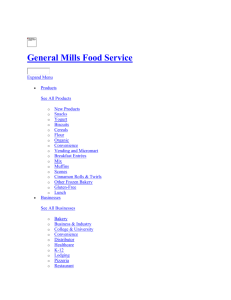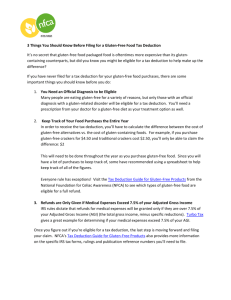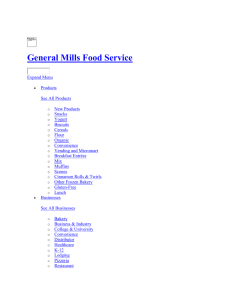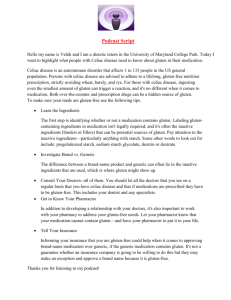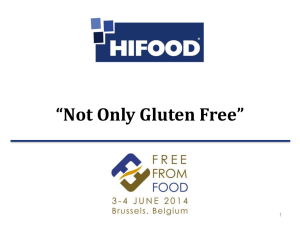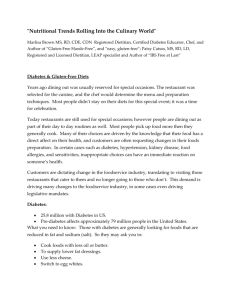Business Plan for
advertisement
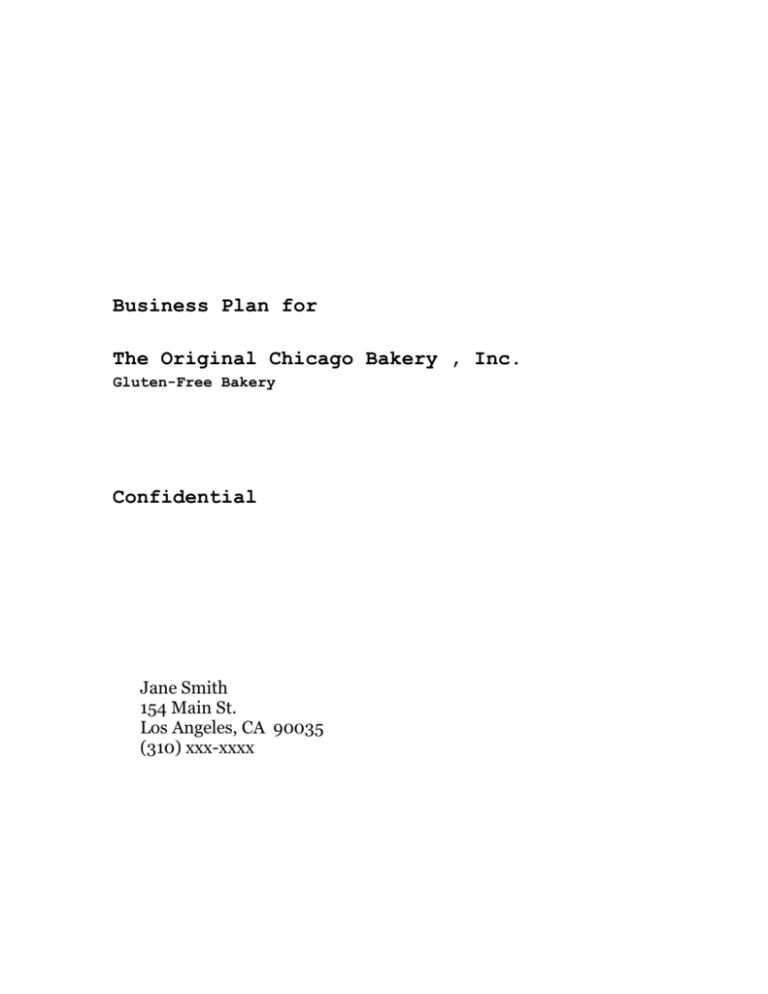
Business Plan for The Original Chicago Bakery , Inc. Gluten-Free Bakery Confidential Jane Smith 154 Main St. Los Angeles, CA 90035 (310) xxx-xxxx Business Plan for The Original Chicago Bakery, Inc. Gluten-Free Bakery Executive Summary ........................ 1 Description of the Business .............. 1 Introduction: the need for a GF bakery ... 2 (What’s a co-packer?) .................... 3 The GF problem — short shelf life ........ 3 The solution — frozen food ............... 4 The GF customer ......................... 4 Traditional GF sales venues .............. 5 Retail GF bakeries ....................... 6 Marketing strategy ....................... 7 Layout & operations plan ................. 8 Start-up budget ......................... 12 Projected income ........................ 13 Projected expenses ...................... 13 Operating budgets Best-case ............................ 14 Realistic ........................... 16 Worst-case ......................... 18 2 Executive summary Rice Cakes Gourmet, Inc. (RCG) is a newly incorporated wholesale manufacturer of gluten-free baked goods (breads, desserts, & snack foods) in downtown Chicago, IL. This document outlines the plans for start-up and the first year of operation, for a total projected budget of $200,000. Description of the Business State of California Corporation #288xxx, subchapter S, named Rice Cakes Gourmet, Inc. on July 20, 2011. 500 shares of stock each issued to the owners. Employer Identification Number 20-530xxxx Owner; Jane Smith 1541 Glenville Drive Los Angeles, CA 90035 (310) 925-xxxx Owner; Sandy Newman 1290 Main St. (310) 925-xxxx Accountant; James (Jim) Karp CHARLES, BLANK & KARP, LLP Certified Public Accountants 4419 Van Nuys Blvd., Ste. 310 Sherman Oaks, CA 91403-2910 Phone: (818) 377-3300 Fax: (818) 377-3555 jkarp@cbc-cpa.com Lawyer; Mark Baer, Esq., 3500 W. Olive #300 Burbank, CA 91505 Phone: (818) 827-7125 Fax: (818) 827.7126 www.markbaeresq.com 1 Introduction: the need for a GF bakery At this time, there are no commercial gluten-free bakeries in Chicago, IL. This is mainly due to the contaminating nature of gluten and the necessity for dedicated facilities. And of course, until recently, a gluten-free diet was considered highly unusual. Perhaps one in five thousand people were diagnosed with celiac disease – a potentially life-threatening condition triggered by eating gluten, a protein found in wheat, rye, and barley. Not anymore. New, improved diagnostic tools have shown that in fact 1 in 133 people, or approximately 2.25 million Americans, have celiac disease, making it one of the most common hereditary disorders — about par with hereditary high cholesterol. 97% of celiacs don’t even realize they have the disease, but continued exposure to gluten can lead to other problems, ranging from an inability to concentrate to infertility to intestinal lymphoma. Celiac disease is quite the hot topic in the medical world. A gluten-free/dairy-free diet has also been indicated in the treatment of other illnesses, most notably autism & related disorders. Some doctors estimate that for every one person who has celiac disease, ten others would benefit from a gluten-free diet. “Glutenfree” is the hot commodity of the health-food world. For example; 2009 retail sales of gluten-free products were $450 million. 2011 retail sales are expected to top $696 million. The market is anticipated to grow at 25% annually for the next four years, to reach $1.7 billion in 2014. (Gluten-Free Foods and Beverages, Packaged Facts, 2006.) Suddenly, everyone wants to make a gluten-free product. And theoretically, everyone can — it’s not that hard. The tricky part is ensuring against gluten contamination. In a normal bakery that’s impossible because the lightweight wheat flour becomes airborne; it gets everywhere, even into the air ducts. And while the FDA won’t issue labeling laws for GF foods until 2008, no one wants to sell a gluten-free product that might make people sick. On the other hand, it’s not cost-effective for most companies to set aside dedicated facilities for the few people who, at this moment, eat gluten-free. [Think about it: If 1% of the population has celiac disease, but only 3% of celiacs have been diagnosed — our 2.25-millionperson market just shrank to 66,000.) 2 So what we have are a few dedicated gluten-free bakeries, nationwide, most either selling directly to the consumer over the internet or wholesale via health-food or upscale grocery stores. What we need is an explosion of gluten-free options to match the explosion of gluten-free dieters. We need a co-packer who can provide the facilities for all those companies to make all those GFproducts. What’s a co-packer? A co-packer is a food manufacturer which produces a product for another company to resell under the second company’s brand name. Usually they provide product development, production (baking), and packaging. When Trader Joe’s offers TJ’s-brand items, they are buying from another manufacturer who just puts the TJ’s label on. That manufacturer is a co-packer. Typically only a percentage of the gross sales comes from co-packing arrangements, and the manufacturer also sells under its own brand. In addition to co-packing activities, Rice Cakes will also sell its own line of breads and desserts to bakeries, restaurants, caterers, etc., throughout Southern California; wholesale to health-food stores & specialty / upscale grocery stores; we will develop markets for catalog / gift items, and secondary processing (i.e., the brownie pieces in Soy Delicious Fudge Brownie frozen dessert); and directly to the consumer with our online (Yahoo!) store. Furthermore, Rice Cakes will provide gluten-free support to food service businesses in the form of information, help developing glutenfree recipes and menus, and acting as a liaison/marketing coordinator to the GF community (for example, if Applebee’s should become our customer, and do a GF-friendly menu with a pecan pie for dessert, we will alert the GF media). The GF problem — short shelf life The biggest problem with most GF baked goods is they get stale so quickly. Inventory management and efficient distribution are the keys to success. But the gluten-free market isn’t like the kosher-foods market, for example, where there is an identifiable enclave, in a relatively specific location, where you can find your customer. Gluten3 free-dieters come in all geographic, socio-economic, and ethnic flavors. The solution — frozen food In the case of breads, it is possible to par-bake the product and flash-freeze it, and sell it with the intent that it should finish baking in the customer’s oven. This is how La Brea Bakery sells their artisan loaves nationwide. It makes for a consistent, high-quality product. We would need packaging to protect the loaves against crosscontamination in the final oven. (Perhaps something like the foil bags used for frozen garlic bread.) With cakes, it is interesting to note that (a) gluten-free cakes are just as tasty as the wheat kind - in fact, you don’t want gluten in a cake. (b) GF cakes keep as long as the conventional variety. Nut tortes, though expensive, actually last longer than those made from wheat. (You don’t notice because most GF products don’t contain preservatives.) Finally, (c) it is standard bakery practice to freeze cakes, sometimes for weeks, before decorating. Even though it means higher storage & distribution costs, concentrating on frozen foods, with longer life of the product, gives us better control of inventory. We can make frozen products in larger batches, which means lower costs. And finally, the quality of the product will be far superior, and that means higher sales. Distribution of fresh items would be limited by the need to get the product into the consumers’ mouth as soon as possible. The GF customer Let’s look at it from the other perspective. How does the average gluten-free individual manage his situation? Sadly for us, most adults tell us they don’t purchase a lot of specialty gluten-free products. They tend to do without, finding it easier on their waistlines & their wallets. They eat potatoes and rice if they want carbs, and nosh on chocolates or sorbet. But everyone eats a sandwich occasionally. Once a year, everyone needs a special dessert on his birthday. And people will always crave pizza. So there is a market for grown-up foods, with a lot of room for 4 expansion if we can figure out what people want and where they might be persuaded to purchase it. Gluten-free children are a whole other story. An adult may not spend on GF-items for himself, but he won’t want to see his child do without. There will be bread almost every day for school lunches, packaged snack foods like pretzels and shelf-stable cookies, and special treats like cupcakes at every party that child attends. Traditional GF sales venues 40% of the retail sales of gluten-free products happen in healthfood stores. (Again, Gluten-Free Foods and Beverages, Packaged Facts, 2009.) The leader in this field is far and away Whole Foods Market. They have their own “Gluten-Free Bakehouse” for ‘fresh’ product that is shipped all around the country out of North Carolina. I’m sure it is delicious but it’s not kosher so I wouldn’t know. This isn’t an “archtypical” bakery selling fresh breads and cakes. It’s more like an Entenmanns’. Whatever the case, we can’t open a gluten-free company without factoring Whole Foods into the equation. And Whole Foods won’t work with a supplier that’s not USDA-certified. We just have to accept the trouble & expense of being certified as a cost of doing business. (And anyway, it allows us to do meat, and chicken-pot-pies.) As soon as we’re certified and ready-to-go we must contact them because our frozen pizza crust blows away what they carry. I believe Trader Joe’s is ready to claim a bigger share of the GF market. Their head office is in Monrovia (near Pasadena – a lot closer than Austin, Texas, where Whole Foods is headquartered) and they just need a consistent co-packer for basics like frozen bagels & waffles & cupcakes. Unfortunately, one source tells us that they’re not willing to pay fair price for a good product. But that was a couple of years ago and things may have changed. Another opening is at Erewhon, where we have a lead. Even better, find a distributor who deals with health-food stores, and handles frozen foods. Go visit, take samples, and take confidence in the fact that it’s an excellent product. Sales to regional health-food (and specialty/upscale) markets means we’ll need some kind of delivery mechanism. You don’t ship 5 UPS to Trader Joe’s. You’ll find payments on a refrigerated van, insurance & maintenance, in the projected budgets that follow. The next-most-frequent way gluten-free foods are purchased is over the phone or over the internet. There’s no way around this one, either; we must provide for online sales. Yahoo! Stores offers a simple, cost-effective way of setting up an online store (www.ricecakesbakery.com) and handling VISA transactions. We’ve budgeted for design on a five-page website, Yahoo! fees, & assumed the manager will handle order fulfillment to start, delivering through UPS. Other ways gluten-free foods are traditionally purchased are just more of the same, really. Conventional grocery stores are increasingly carrying GF products (albeit at a higher price than at the health-food stores). Some GF-online-superstores carry a number of different bakeries’ products. I believe there is an untapped market in gift catalogs (for example, GF-Christmas fruitcakes and gingerbread men, both of which keep & ship well.) Retail gluten-free bakeries Retail bakeries and bakery/cafés are popping up around the country, and at some point we should consider a retail outlet. Chicago sprawl is a factor to consider — one mother of a celiac child told me she would drive a couple of miles to go to a GF bakery, but beyond that it would be easier for her to order online. It’s better for our customers for us to bring the product closer to them, by selling to other stores, bakeries, and restaurants. In the case of a bakery/café, we have to remember that celiacs are used to doing without. Rather than always make all his friends and relatives drive to eat at ‘his’ special GF café, it’s likely Joe Celiac will sometimes want to go to a GF-friendly establishment and sometimes he’ll go somewhere else and eat a baked potato. Joe is actually better served by providing for more GF-friendly restaurants where he can trust the salad dressing and maybe splurge now and then on a slice of chocolate cake. 6 Marketing strategy During the week, we market to other businesses. On weekends, we go to celiac support group meetings and give samples of our products and talk about where it can be purchased. Meeting the people, finding out what they want and where they want to buy it, is priceless market research. And sampling is the best advertising. In the same vein, we can distribute coupons, both to consumers and to editors of the GF-magazines and newsletters. Perhaps we can even barter for advertising space, killing two birds with one stone. Each business will require its own approach. Not just each type of business, but each specific business. For example: Whole Foods and TJ’s actually require totally different approaches. TJ’s will likely need a package of frozen bagels or petit-fours to offer at competitive prices. Whole Foods may want to offer finished loaves of artisan breads, or fresh cakes in the self-serve bakery. We’ll have to see. The bread and butter of the business will be the 1000’s of frozen desserts and ready-to-bake breads sold directly to 100’s of food service establishments. It’s all about just going out and making those sales calls. The August restaurant trade convention should be a good place to hand out business cards. A nice touch would be to send a pretty box with a cupcake and a card to sales prospects and follow it up with a phone call. When we meet, part of the visit can be to explain to the business owner or chef about gluten and brainstorm ways to be more glutenfree-friendly. By offering value first, without expectation, we set up a relationship with the client. A mutually profitable relationship. Bakeries can sell frozen baked goods (as Schwartz will do) or frozen-par-baked loaves baked to order in our gluten-free foil packaging (as Breadbar might). Bakeries could also special-order items like cakes & holiday pies, or stock a limited number of small cakes weekly (or 4-packs of iced cupcakes) or a shrink-wrapped, decorated holiday cookie. Other markets are hotels, particularly ones that do conventions; places like Universal Studios & Disneyland; commissaries & caterers that do business lunches; hospitals & nursing homes; and basically anyone who feeds masses of people daily. 7 Layout & Operations Note that all the major improvements (walls, plumbing, heavy-duty wiring, gas, venting, and floor drain) can go along one wall, which will save $$ on build-out. The other side of the bakery doesn’t really even need walls – partitions made of sheet metal and/or wire grids would work & save space & $$. Floors & walls need to be sealed. That side can hold wiring for telephone, computer networking, burglar alarm and security cameras. 1. Loading door – to alley – this is main entrance to bakery. Needs fan above &/or screen. Punchclock next to the door. Space for staging deliveries in & out. 2. Private office — next to the front door so the manager can have a clear idea of traffic in & out. Inside a locked door is a safe, checkbooks, and confidential files. This is where the telephone hub is, the internet cable in, and the networking cables out. Also wired into computer are three security cameras & possibly the alarm system. Office software & bakery software (must be new, obviously.) (But computers don’t! Better an old PC with fast internet, than vice-versa.) 3. Shipping/receiving desk – counter height w/ computer, telephone, space for P.O.’s, receiving scale on floor, hand truck. Also postage scale, UPS boxes & forms. Needs floor space for racks. 4. Public office – desk, chair, computer, telephone, all-in-one printer/scanner/fax/copier. Files/records storage. Space above for water cooler & coffee machine. Bakers will use this space for ordering, inventory, and break-time. 5. Employee break area (with 5a, lockers) — couple of couches, a coffee table, & another telephone. 6. Rest room #1 — standard issue, one toilet, one sink, mirror, paper towel dispenser / trash receptacle. Floor drain. Vent to alley side of building. 8 7. Maintenance closet— with sink, shelving for cleaning supplies, hooks for mop & broom, and stacked washer/ dryer to save on linen expenses. 8. Rest room #2 — like rest room #1, only perhaps with shower head behind a half wall. Vent, floor drain, etc. 9. Walk-in freezer (7.5’ x 12’) 10. Walk-in refrigerator (7.5’ x 12’). Reserve space for rack. 11. Packaging center — cake boxes with tamper-evident seal (i.e, “safe-t-gard” at www.inlineplastics.com/news.php); plastic bags with “innosealer” (www.innoseal.com). Not so high-tech but effective. Shrink-wrap-sealer and film, boxes. 10’ work counter, with stool, and space for racks. Access to freezer. Obviously packaging takes place here, and also inventory management. 12. Decorating center – decorating machine, traditional pastry bags, assortment of tips. 10’ workbench, with stool, telephone, space for paerwork. Lots & lots of storage, shelves, little cubbies & boxes. (One day with own hot-top burner, microwave, small mixer &/or reach-in fridge? to take pressure off main work centers.) Access to both freezer and refrigerator. 13. Dry storage — Seven 5’-long wire shelving units, 27” deep. Plastic storage bins. Step ladder. 14. Dishwashing area — Bakery-sized 3-drop sink. Garbage & recycling center. One day a rack dishwashing machine (a whole rack of pans could be wheeled into it) but otherwise, a pan-type dishwashing machine. 15. Scaling center —bins, scoops. 8’ workbench. Baker’s scale. Shelving above with smaller bins. Access to sink across “hall,” dry storage, & cooler. 16. Mixing center — Hobart, 60 qt., with attachments & extra bowls. One day – a bowl lifter on wheels (can take bowls to extruders). 9 17. Cooking area — prep sink with drain, 7’ stainless counter, combination range-type oven & 6-burner cooktop, steam kettle (double, if possible, to use one for chicken pot pies), and separate bagel kettle (different animal). Microwave, knives, cutting boards, food processor, measuring tools, pots, whisks, colanders. Here’s where pie fillings, custards, cream frostings, etc., are born. Bowl-lifter should be able to access steam kettles. 18. Work area #1 — 12’ workbench, wet glop extruder (allpurpose, adjustable output), all work tools, pins, pans, piepress, space for racks. 19. Work area #2 — similarly outfitted to #1, but more for bread-making, and less for cakes, due to proximity to ovens. 20. Single (one day a double) revolving rack oven, proof box, and rotating 24-pan oven – one of the newer, smaller models. This combination provides the most flexibility for different products, with excellent space, fuel, and labor efficiency. Upgrades are available, such as an oven-loader for the pan oven. Ventilation can go straight through the ceiling & roof. Mason-block construction is preferred for insurance reasons, and ovens can be placed closer to wall . 21. Emergency exit to street. Possible mail delivery. Door should be alarmed, with metal screen door for ventilation and security. Fan above door for bugs. 22. Window could be frosted for privacy, but should have sign facing street. Free ad space, baby. 10 Start-up budget Lease (1st & last month’s rent) $10,000 Get 3 month’s rent abatement , and work out contingency for waiting for health dept. permits. Sometimes takes as much as 6 months! (Do it right the first time, but allow 6 months, in case. – try to negotiate deferred rent!) Construction: $20,000 Equipment (used, good quality) 60,000 Salaries during build-out 15,000 Legal (Incorporation, state forms, EIN number) 1,500 Accounting, tax prep. 1,500 Graphics & Marketing Materials 3,000 Corporate identity, business card, website design, some packaging design, signage outside building, POP signs Beginning Inventory 2,000 SUB-TOTAL $113,000 Contingency $12,000 TOTAL START-UP $125,000 11 Income Projections Ideally by the time we open we should have solid contracts with a few mid-sized buyers like Schwartz Bakery and the Breadbar (who might eventually run as much as $1000/month each), and one big buyer like Coffee Bean (who, once they sell Rice Cakes across Illinois, might do $750/day or over $20,000/month). I think larger stores like Whole Foods or TJ’s are going to want to see us open and fulfilling orders before buying from us, but that aspect of the business might eventually bring in $50,000 per month. Ultimately we could do $125,000 a month in 2000 square feet. Since we are a new company, it is important not to grow too fast and take on more contracts than we can handle. The projections reflect a slow and steady growth without sudden spikes that will create havoc with our workload. We think we can reach break-even point before the end of year one, and begin paying off start-up costs by the end of year two. 12 Projected Expenses Cost of Good Sold: Industry standard is 33%. This includes packaging. In general wholesalers operate on smaller margins but make it up in volume, but ours is a specialty product and commands higher price. Rice & other gluten-free flours have high cost compared to wheat varieties (average “volume” price is $1/lb., compared to pennies for wheat flour) and we’ll have to see what the market will bear. Payroll: Industry standard is just under 25%. Gluten-free batters and doughs have a different consistency than regular products, and require special handling and different equipment. Once we’re operating at full capacity, we’ll be able to stick to 25% but only because we are charging more for the product to begin with (to maintain 33% food cost). Misc. Services: This includes ongoing monthly accounting & legal fees, janitorial, equipment maintenance, exterminator, and graphic design; etc. Rent: 2000 square feet at $2 per square foot, plus triple net. Hopefully it will be less than the $5,000 budgeted for. Supplies: Includes cleaning & maintenance supplies, small equipment, office supplies (including coffee for the staff!) & stationery. Debt Service: Assuming interest only, at first, on $120,000 loan. Payments to principal will begin when we can afford to do so. Advertising: Set at $1000/month until $50,000/month sales, then 2% of income. Marketing plan is in an appendix, but to sum: bulk of this money will be spent going to gluten-free support groups and sampling products, and to pay for point-of-purchase marketing (like “Order your gluten-free birthday cake here!” signs.) As budget increases, it may be worthwhile to share costs of advertising with our customers (“Rice Cakes, available at these fine stores.…”) but first we’ll explore options for free publicity. Insurance: Includes not only fire & liability but also vehicle insurance and worker’s compensation. Eventually we’ll have to offer health insurance options for key employees. Utilities, Linen, & Trash Removal: All fairly straightforward. We will save $$ by doing our own linen. 13
